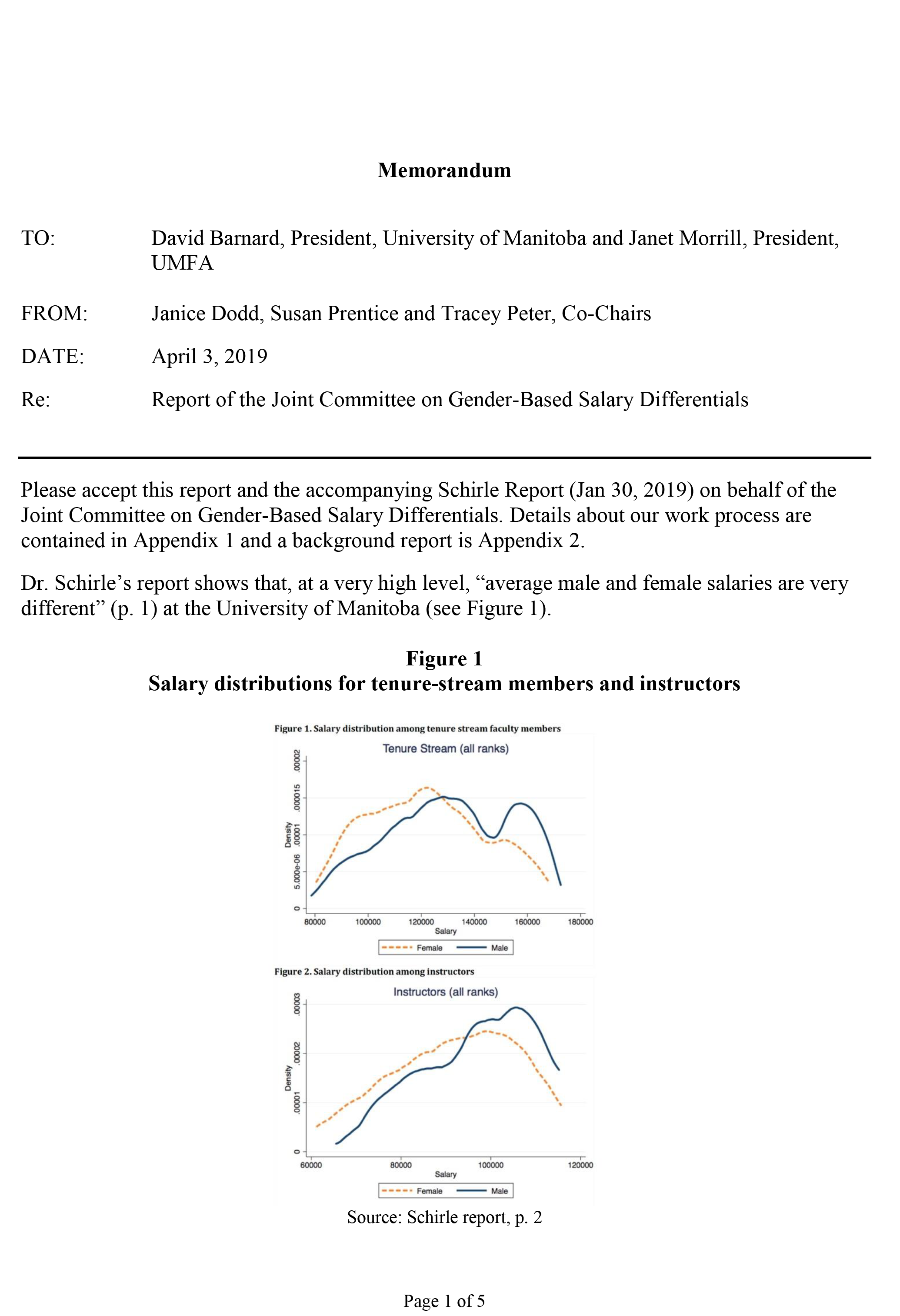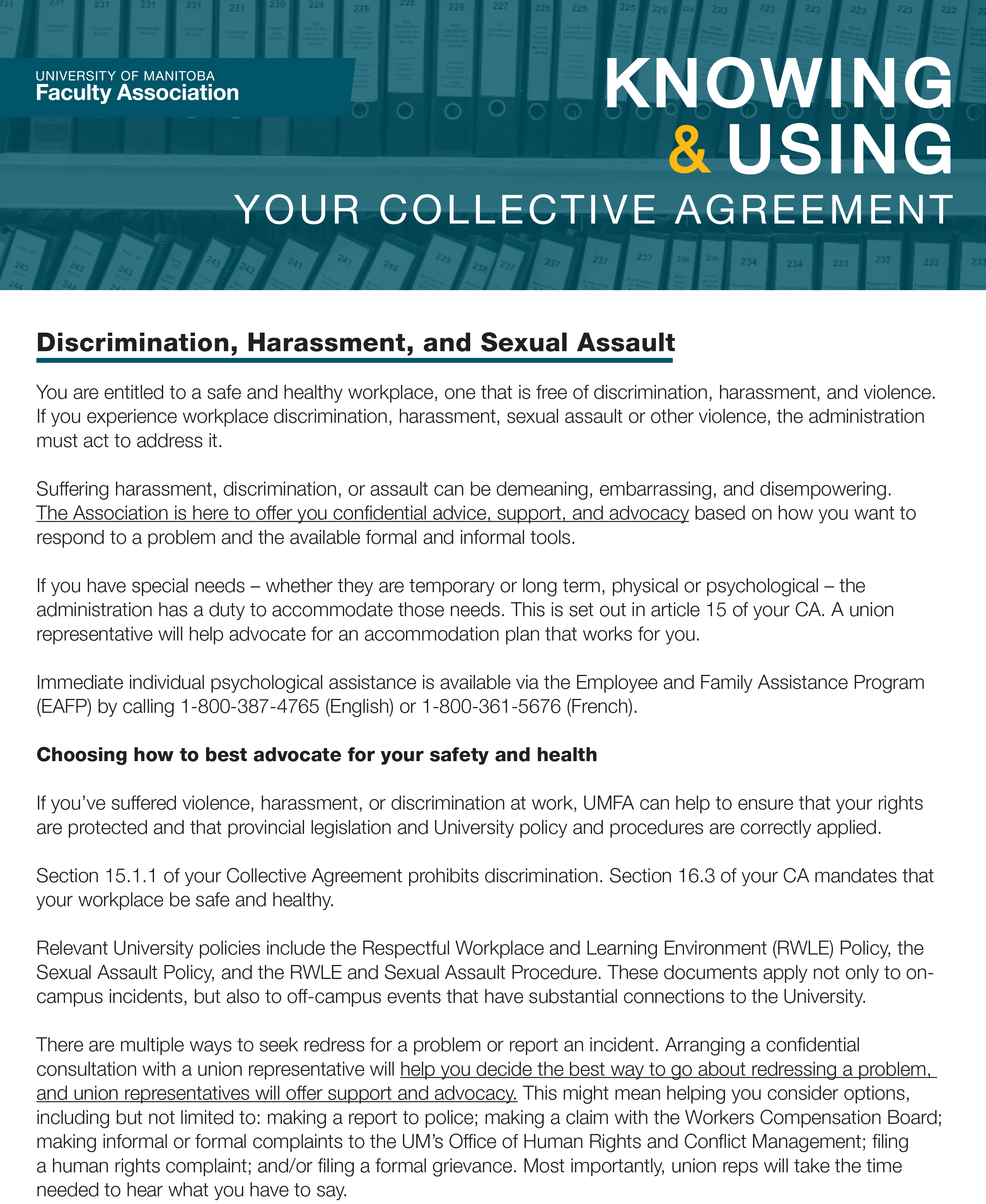Gender Solidarity Working Group (GSWG)
Gender-based Salary Differentials — Joint Recommendations
At the conclusion of negotiations in 2016 the administration agreed to strike a joint committee to look at the salaries of Members and determine if there salary gap between male- and female-identified faculty. While there were some bumps along the road, a study was produced in January of this year and presented to the Board of Reps in May.
Based on the report, the committee made the following recommendations, which will inform our work as we move toward negotiations in 2020:
- The annual scrutiny of faculty salaries, using ORS, Blinder-Oaxaca and multi-level modelling and other sources of information, including exit interviews (see Recommendation 7), with a written report to the University community and UMFA at least once every five years;
- Qualitative study of male and female instructor salaries, where evidence suggests sex-based salary gaps;
- Further study into career progression at the University to understand why women are 15.5 percent less likely than men to be Full Professors at year 12 and onward;
- Qualitative and survey research into male and female workloads, in order to understand both women’s slower career progress and marked differences in employment past age 65, as well as other climate-related issues;
- Study into a different dimension of possible salary inequity, namely gaps in members’ pension fund accounts, which may affect income in retirement;
- More sustained and resourced efforts to ensure equity in faculty hiring, given that women remain under-represented in many disciplines and faculties.
- Exit interviews when faculty resign or retire, in order to assess how climate and related factors may impact recruitment, retention, and career progress. Data from such exit interviews should be integrated into public reporting (under Recommendation No. 1).
Special thanks to the UMFA representatives on the committee for their hard work: Drs. Susan Prentice (Sociology), Tracy Peter (Sociology), and Tina Chen (History).
Joint Committee Final Memorandum
Study of Gender-based Salary Differentials at the University of Manitoba - Final report
President's Message: Gender solidarity at the University of Manitoba
We have all seen messages from David Barnard and the Administration over the last few months regarding their distress at the instances of sexual assault and harassment at the UM and their resolve to root out this behaviour, protect members of the UM community, and discipline the offenders.
It is an employer’s responsibility to ensure a safe workplace for their employees and, in the case of a university, its students. It is the responsibility of a faculty association to ensure that the employer meets its responsibilities to Members, and that Members subject to investigation or discipline are accorded due process.
If you have experienced harassment or sexual violence, our job is to ensure that the employer does their job – treats your complaint seriously, ensures you are safe and get access to the resources you need, and follows appropriate protocols. Members accused of sexual violence or harassment should contact the UMFA office immediately to ensure that the administration acts in accordance with law and the collective agreement.
Nevertheless, there is room for improvement of the administration’s actions and UMFA’s interventions. Late last fall the Board of Representatives formed a GenderSolidarity Working Group to contribute to defending and promoting working relations across genders. That group includes representation from the UMFA executive, our professional staff, our grievance officers, our diversity and equity committee, and the Board Representatives.
One of the first, and most important, tasks of this group will be to hold gatherings in the coming months to hear Members’ concerns and suggestions about preventing sexual harassment and assault on campus. The results of these gatherings, in tandem with solicited additional confidential/anonymous feedback, will be used to inform UMFA policy about how Members are supported, and inform demands made to the administration.
Based on that information, as well as UMFA’s past experiences, the working group will:
- identify deficiencies in and alternatives to the current UM Respectful Work and Learning Environment and Sexual Assault Policies and Procedures;
- In preparation for collective bargaining, identify deficiencies in and recommend improvements to the Collective Agreement related to issues of sexual harassment and violence and report them to the Collective Agreement Committee for inclusion in our forthcoming bargaining proposals and communications;
- identify possible improvements to CAUT policies in regard to safety and health, harassment, and sexual harassment; and
- identify deficiencies in and recommend improvements to UMFA’s Bylaws and Standing Rules in regard to sexual harassment and sexual assault, including recommendations regarding gender composition for grievance officer selection procedures and complainant choice in grievances involving sexual harassment or sexual violence.We will be in touch about the best way to meet with those who’d like to share their experience and knowledge. Please don’t hesitate to contact me or the UMFA office if you need help or have any suggestions for us.
Best wishes for the remainder of the term.
Janet Morrill
UMFA President
- Gender Solidarity Working Group Mandate
- May 2019 President's Message: What is the Gender Solidarity Working Group?
- UMFA Letter to the UM Administration: Revision of Behavioural Policies and Procedures (RWLE and Sexual Violence)
- Know your CA: A workplace free of Discrimination, Harssment and Sexual Assault



